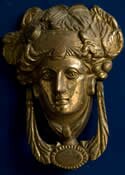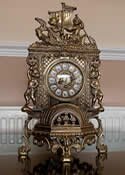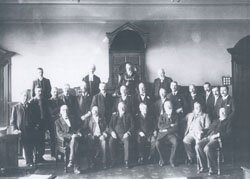
Eccles Local History



Eccles derives its name from the Celtic word for church, and certainly its parish church of St Mary (parts of which date back to Norman times) has had an important role to play in the history not only of Eccles itself but of the surrounding townships that formerly came within the parish. The names of some of these places - such as Pendleton, Barton, Monton and Winton - are indicative of Saxon farmsteads or settlements.
Although the name of Eccles did not appear in the Domesday Book, the manor of Barton has had a long history, the lords of this manor having the right of nomination to the benefice of Eccles. The Lordship of Barton passed to the Booth family by marriage and then, again through the female line, to the de Traffords who were lords of the neighbouring manor of Trafford which they held in unbroken succession from Norman times until 1896. Other notable local families were the Worsleys and the Breretons, both of whom figured in the Eccles story. Although Eccles remained industry-free until well into the latter part of the 18th century,
Barton was transformed by the building, by the Duke of Bridgewater of the Bridgewater Canal. At Barton the canal's engineer, James Brindley, constructed his famous aqueduct to carry the canal over the River Irwell, and the fIrst barge loaded with coal used this engineering feat in 1761. Yet another canal- the Manchester Ship Canal (opened in 1894)-
was to have a great effect on the life of the area. In the earlier Victorian period, however, the railways came to and through Eccles. In 1830 the Liverpool and Manchester Railway was finally completed after great difficulties in crossing Chat Moss This line will always be remembered for the tragic opening-day accident when William Huskisson MP, was knocked
down and taken to the Eccles Vicarage, where he later died.
Industrialisation of Eccles was first in the form of silk mills but later as the suitability of the Lancashire climate for spinning and making-up cotton was realised, some Eccles mills turned to this 'new' commodity. Many workers moved into the town, often to small houses without proper amenities. The cotton industry was hard hit by the cutting off of raw supplies during.
The American Civil War but Eccles escaped fairly lightly as, unlike some other Lancashire towns, it had various other industrial activities. In 1836, for instance the famous Scottish engineer, James Nasmyth, inventor of the steam hammer, opened his ironworks at Patricroft, where a wide range of machine tools and locomotives were produced. Later, in 1873, the
Protector Lamp and Lighting Co Ltd was formed and this company produced the very first motor-driven fIre engine in England. To cope with the needs of the growing town, the Barton, Eccles, Winton and Monton Local Board of Health was formed in 1854. In 1892 a Charter of Incorporation was granted to Eccles. Eccles remained a Municipal Borough until the end of March 1974 Municipal Borough of Eccles Coat of Arms.